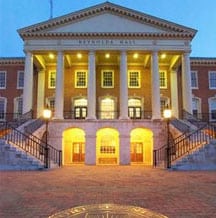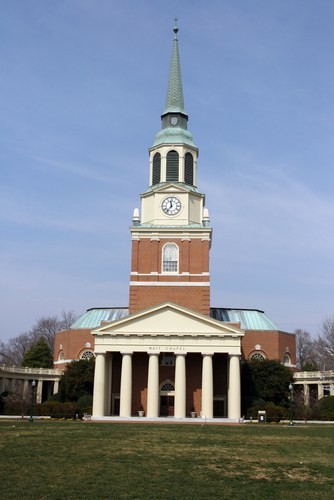importance of utilizing their entire college experience – and not waiting until their senior year.
As the name of the office communicates, students must first engage in their personal development and understand the importance of assessing and knowing their own interests, values, beliefs, personality, strengths and goals. Students are encouraged to study themselves and learn frameworks for self -understanding, to explore their personal interests and desires, and think about their values and purpose – asking “Who am I and who do I want to be?” before “What shall I do?” Students achieve this through assessments and mentoring conversations with their respected and influential “adult fans” such as faculty, parents, advisors, mentors, counselors and coaches.
Wake Forest Career-to-College Courses
Students also have the opportunity to earn course credit for this self-assessment work. With financial and staff support from the OPCD, the academic Department of Counseling offers a series of four College-to-Career Courses with

the first focusing on self-discovery. Entitled “Personal Framework for Career Exploration,” this course provides thought-provoking activities, readings and reflections to help students understand their personal strengths, interests, values and beliefs, which strengthen their abilities to make sound career decisions.
In the second course, “Options in the World of Work,” students begin the crucial task of understanding the range of careers available and consider which careers will best align with their interests and needs. “Strategic Job Search” is the third course in which students learn about and create professional documents such as resumes and cover letters while learning how to network and interview effectively.
In the final course, “Professional and Life Skills,” students consider the concept of a holistic life and learn the practical aspects of independent living such as personal budgeting, basic financial planning, choosing health and insurance benefits and understanding the dynamics and expectation of the 21st century global workplace.
LinkedIn and Networking
Wake Forest is also innovative in its expansive use of LinkedIn in the career exploration process. Wake Forest students are taught and encouraged to learn about the world of work through proactive networking and researching. The OPCD has enabled students to utilize LinkedIn to connect with alumni, parents and employers to learn about various careers and industries. During counseling appointments, workshops, courses and instructional videos on the OPCD website, students learn how to create a LinkedIn profile and are taught how to utilize this resource to find informational interview contacts.
Additionally, the OPCD has created a LinkedIn group called the “Wake Forest Career Connectors” designed exclusively to connect Wake Forest students with helpful faculty, staff, parents, and alumni in different careers around the globe. Currently, there are more than 6,300 members in the group including approximately 2,000 students, 75 parents, 130 faculty and staff, and 4,100 alumni, and it continues to grow and evolve daily.
Wake Forest Career Treks
To supplement this digital approach, Wake Forest encourages in-person career exploration outside of campus as well. In new initiatives this year, the OPCD has taken students across the country on a series of career treks and set up job shadowing opportunities for students over fall, winter, and spring breaks. Partnering with Stanford University and the University of Chicago, Wake Forest offered career treks to students in Washington, D.C., Chicago, and San Francisco.
Fifteen students from each school attended each trek where they became familiar with companies in the respective cities, expanded their and were able to explore the city as a potential destination for themselves after college. With similar objectives in mind, Wake Forest also offered a job shadow day with companies in North Carolina for more than 60 students over fall and spring breaks. Wake Forest alumni have played a significant role in providing opportunities like these to students.
College-To-Career Community

 What we need are college administrators across the country to start taking career and personal development as seriously as the folks in Winston-Salem.
What we need are college administrators across the country to start taking career and personal development as seriously as the folks in Winston-Salem. the first focusing on self-discovery. Entitled “Personal Framework for Career Exploration,” this course provides thought-provoking activities, readings and reflections to help students understand their personal strengths, interests, values and beliefs, which strengthen their abilities to make sound career decisions.
the first focusing on self-discovery. Entitled “Personal Framework for Career Exploration,” this course provides thought-provoking activities, readings and reflections to help students understand their personal strengths, interests, values and beliefs, which strengthen their abilities to make sound career decisions.